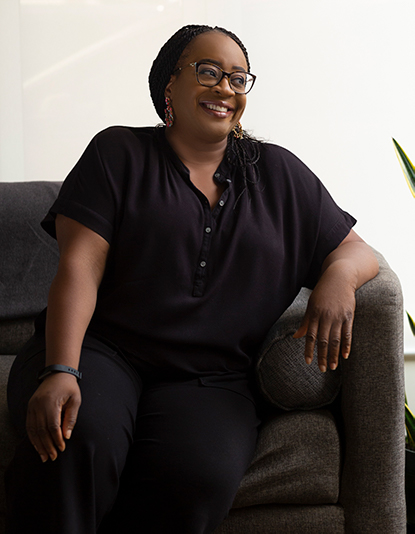
Nnena Nkongho
Years in Tech
10
Current Role
Principal, Digital Growth Africa (DiGAME)
Core Skills
I am lucky enough to spend my days engaging with people and ideas that build better lives across Africa.
Interview Date
14th December, 2018
Since 2008, Nnena has been involved in the African technology ecosystem—as an investor, early stage company employee, consultant, advisor, mentor and coach. She’s currently a Principal at Digital Growth Africa (DiGAME), an investment vehicle focused on supporting entrepreneurs who are building African, tech-enabled businesses with growth capital since its launch in 2016. Prior to DiGAME, she spent time as an early employee (Head of Business Development) at SOLO Phone (Nigeria), Interim Head of Strategy at Etisalat Nigeria (now 9mobile) and as a TMT Analyst at Nubuke Investments. Early in her career, she worked in Merrill Lynch’s arbitrage group and the M&A Group at Morgan Stanley. Nnena has her BA from Princeton University, her MBA from Columbia Business School and is a current Kauffman Fellow.
Personal Links
What experiences led you to technology and how did you develop the skills to compete in the industry?
My parents tried living in Africa when I was growing up, but it was hard–with New York children like me and my siblings. Africa was much more difficult to navigate then and Lagos we know today is not the Lagos of those days–let alone the Lagos of the year 2000! My observations of life in Africa–from childlike observations of the lack of hard and soft infrastructure to the daily challenges of life led me to tech. I was a firsthand witness to how African lives were transformed, first by the widespread adoption of the mobile phone and subsequently by technology’s application across all facets of life to inspire me to play a role in this transformation. I’ve developed a healthy sense of what’s possible because I’ve seen the change here in Africa. Tech will continue to drive improved lifestyles globally and I’m committed to ensuring African- based, tech enabled ideas have a shot at spreading in ways we can’t even imagine today.
I entered the technology sector via the asset management industry, first as an investor focused on the TMT (Telecom/Media/Technology) segments across Africa, then in strategic operating roles at a mobile network operator and as telecoms industry consultant in Nigeria followed by a position as an early employee at a Nigerian tech startup before returning to my ‘roots’ as an investor in the African technology-enabled space. All of my sector knowledge was (and continues to be) self-taught. I have always been naturally curious, a ‘learner’, whose love of reading anything and everything is only surpassed by a love of asking questions about everything and of anyone who will listen—the ‘why’s’. I am a prolific consumer of knowledge irrespective of the format: books, blogs, articles, television, podcasts, MOOC courses and, of course, other people, and understand that my edge or ability to compete is directly related to my ability to leverage that knowledge through a filter of my past professional experience and network to identify and support great founders in building large and profitable businesses in Africa.
How has your background helped/differentiated you in the tech industry?
I’ve witnessed and contributed to two significant moments in world economic history: the African and Asian technology ‘booms’! I gained global exposure working in post-crisis Asia, building on the ground experience that I’ve been able to apply in the African context. This experience led me to ‘double down’ on building, operating, and backing groundbreaking ideas applied in Africa. This global perspective of markets, companies and environments in North America, Asia, Middle East, and Africa, provides me with unique insights that help me identify founders with the ability to scale great businesses globally.
What advice would you give to women considering a career in technology? What do you wish you had known?
The advice I would tell other women is work on building both functional skills and industry relationships throughout your career. This will afford you the broadest impact and widest number of professional possibilities. During the early years of your career, it can sometimes seem that functional skills are the critical components of success; however, these skills are only prerequisites for getting your “foot in the door’ and landing a position or role. Strong relationships, especially as the foundation of an active and useful professional network, are equally, if not more critical, to long-term success. Relationships over your entire career provide support and guidance, uncover opportunities, access (new) knowledge, and help you navigate the inevitable challenges.
It is critical that women consider their relationship building as a core asset to their professional development.
Any other thoughts on women in technology?
Speak up! Share your ideas and claim your place in conversations.



